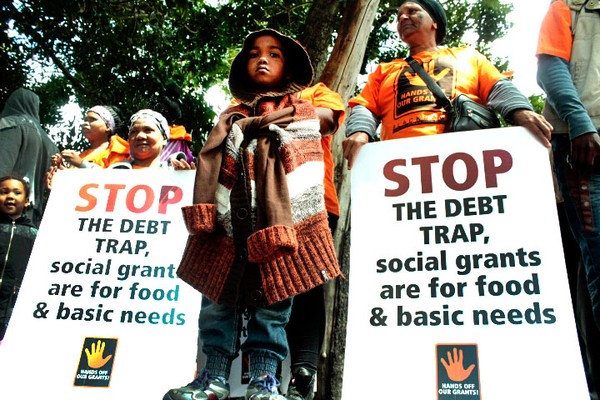R4,000 taken from 89-year-old’s pension for a loan he never took out
Black Sash takes on Net1 in social grant deductions court battle
Eighty-nine-year-old pensioner Sipho Bani had to spend several months and more than R400 to stop deductions from his old age pension on repayments for a loan he never took out.
Between May 2015 and February 2016, R4,391 was deducted from his South African Social Security Agency (Sassa) branded account in repayments for a loan from FAJ Financial Solutions - a Uitenhage company Bani, who lives in Nyanga, had never heard of.
When he complained, SASSA officials in Nyanga sent him to the Sassa office in Gugulethu; there he was told to go to the Gugulethu Paralegal Advice Office, where he was told to go to the offices of Cash Paymaster Services (CPS), the company which pays out the social grants on behalf of Sassa, in Philippi. The CPS Philippi office sent him to CPS in Bellville, where he was told the deductions were for a Finbank loan. Bani went to Finbank, only to be told the bank had no record of a loan to him.
It was only when Bani approached the Black Sash that the mystery was solved: his SASSA-branded account had been debited incorrectly by the Uitenhage company because of a mistake in the account number. A total of R3,603 was paid back into his account.
Bani is one of six victims of illegal or unauthorised deductions whose testimony forms part of a founding affidavit lodged by Black Sash national director Lynette Maart with the North Gauteng High Court. The Black Sash and the six recipients of social grants are applying to be allowed to intervene in the court battle between Net1 and SASSA.
Net1 and several of its subsidiaries and associated companies are asking the court to rule against any restrictions on deductions from the bank accounts of grant recipients. The companies involved include Manje Mobile, which sells electricity and airtime, Finbond Mutual Bank, SmartLife Insurance, which has sold insurance policies to about 130,000 social grant recipients, and credit company Moneyline. The matter is due to be heard in October.
In her affidavit, Maart argues that millions of grant recipients have been victims of “exploitative practices” by corporates which have “unjustifiably depleted their social grants” through deductions for airtime, loans, and funeral insurance among other things.
“By their nature, grant beneficiaries are the most marginalised members of our society - the elderly, the disabled, and children who are in need of social assistance in order to have the most basic necessities of life,” Maart says.
She says the work of the Black Sash with grant recipients has shown that many grant recipients think that CPS - and even Moneyline - are part of Sassa. In some cases, officials from CPS, Moneyline or Net1 administer loans inside Sassa pay points, in spite of regulations under the Social Assistance Act which prohibit lenders from being within 100 metres of a paypoint.
The Black Sash has observed Moneyline and Net1 issuing loans on payday inside pay points, Maart says in her affidavit.
In many cases, she says, the beneficiaries “have no knowledge of how they have been sold electricity or airtime”.
“They just notice a deduction on their slip when their monthly payment is made.”
Maart says the Black Sash recognises that adult grant recipients have the right to buy funeral policies, airtime and other products, and take out loans.
But because of “the rife exploitation” of social grants, she says, these services should not be marketed at pay points, and social grant accounts should be ring-fenced.
The Black Sash wants the court to direct the Minister of Social Development to ensure that social grants are effectively protected against exploitation or abuse. “The view of the Black Sash is that the best way to do this is to ring-fence social grant accounts,” says Maart.
Support independent journalism
Donate using Payfast

Don't miss out on the latest news
We respect your privacy, and promise we won't spam you.
Next: Kalk Bay’s fishers battle for permits
Previous: BASF workers on strike because of dispute over back pay
© 2016 GroundUp. 
This article is licensed under a Creative Commons Attribution-NoDerivatives 4.0 International License.
You may republish this article, so long as you credit the authors and GroundUp, and do not change the text. Please include a link back to the original article.

